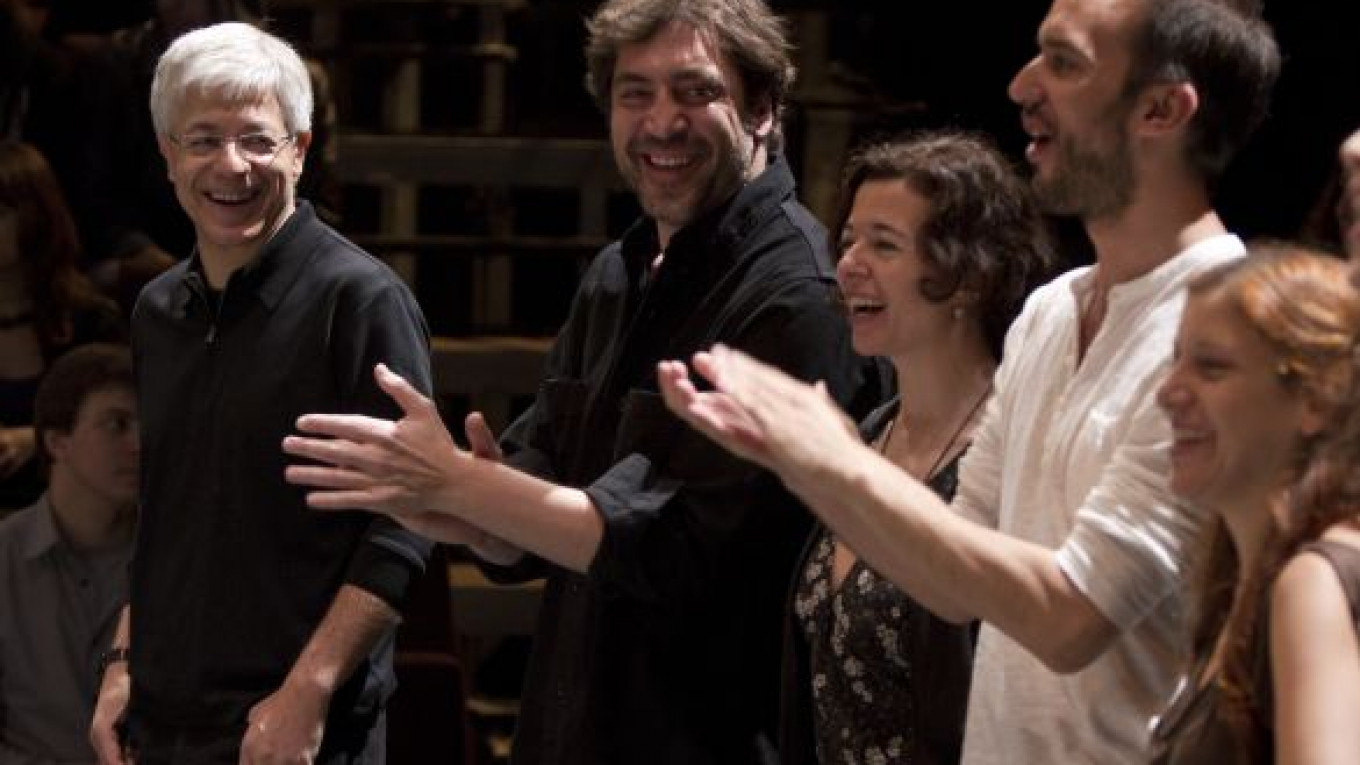If there is anyone who should be able to act the words “to kill,” then it is Javier Bardem, whose chilling performance as the brutal murderer in “No Country for Old Men” won him an Academy Award.
Standing in the Meyerhold Theater in central Moscow recently, Bardem impressed and scared when asked to act those two words, as part of a Spanish meet with Russian actors led by his old acting teacher Juan Carlos Corazza.
Bardem and Corazza were in Moscow as part of the ongoing year of Spain in Russia that saw Corazza put on “Remembering Yerma,” a powerful interpretation of a Federico Garcia Lorca play to huge success.
Spain’s premier drama school, Corazza Actors Studio, came with Bardem in May as part of the Celebration of Russia, Cradle of Modern Theater festival at the Meyerhold.
“Russia is to our mind the origin of modern theater: Such dramatists as [Konstantin] Stanislavsky and [Vsevolod] Meyerhold are essential to the development of modern theater in the 20th century,” Spanish Ambassador Juan Jose Herrera de la Muela said in an interview.
The play they performed, “Remembering Yerma,” is about a woman in rural Spain who is obsessed with her inability to bear a child.
She is distraught, angry at her shepherd husband she does not love, jealous at the mothers around and ashamed of herself for failing to be, in her opinion, a real woman with a real purpose.
The young actors performed “Remembering Yerma” with a dazzling intensity, 90 minutes of fluttering sheets, roving hands, tumbling bodies, beating drums and malicious whispers that left audience members cheering wildly.
“The text of ‘Remembering Yerma’ is very beautiful, and the performance by students is wonderful, mind-blowing — I cannot think of another word to describe it,” de la Muela said.
After the performance, a question-and-answer session became a heartfelt conversation. A young audience member praised the Spaniards’ “non-Moscow naivete.” An older man said, “I’m a financier, but when I watched the play I wanted to cry at certain parts!” A third compared the performance to the purity of a mountain stream.
“[The play] is about Spanish society, which, under the power of the Catholic Church, pressured and killed the humanity of its people, their feelings, love,” said Corazza, a kind-looking, white-haired figure. “This was a society that wasn’t in a position to protect pleasure … that banned it. Such a society can’t survive forever, can’t be fertile.”
The day before, Bardem had talked about what made his old friend and teacher special.
“Corazza’s laboratory approach to theater is what sets him apart,” he said at a news conference. “It’s important to try something new, but in such a way that it’s not a lie. … Juan Carlos teaches an actor to be himself, preserving his own sensitivity.”
Two days later, Corazza, Bardem and other Spanish actors met with Moscow students. The meet consisted of a series of exercises where mixed Russian-Spanish pairs were asked to perform a single word at their partners. Bardem was a natural with his word, they said.
“I was actually frightened!” said Adelina Gizatullina, one of those taking part.
Most noticeable for students was seeing the raw passion and energy of the Spanish actors.
“You should have seen the way the men and women looked at each other!” Gizatullina said. “They demonstrated a striking level of freedom that [my classmates], and I in particular, don’t have.”
For more info about the year of Spain in Russia, see .
Ivan Juritz contributed to this story.
A Message from The Moscow Times:
Dear readers,
We are facing unprecedented challenges. Russia's Prosecutor General's Office has designated The Moscow Times as an "undesirable" organization, criminalizing our work and putting our staff at risk of prosecution. This follows our earlier unjust labeling as a "foreign agent."
These actions are direct attempts to silence independent journalism in Russia. The authorities claim our work "discredits the decisions of the Russian leadership." We see things differently: we strive to provide accurate, unbiased reporting on Russia.
We, the journalists of The Moscow Times, refuse to be silenced. But to continue our work, we need your help.
Your support, no matter how small, makes a world of difference. If you can, please support us monthly starting from just $2. It's quick to set up, and every contribution makes a significant impact.
By supporting The Moscow Times, you're defending open, independent journalism in the face of repression. Thank you for standing with us.
Remind me later.






